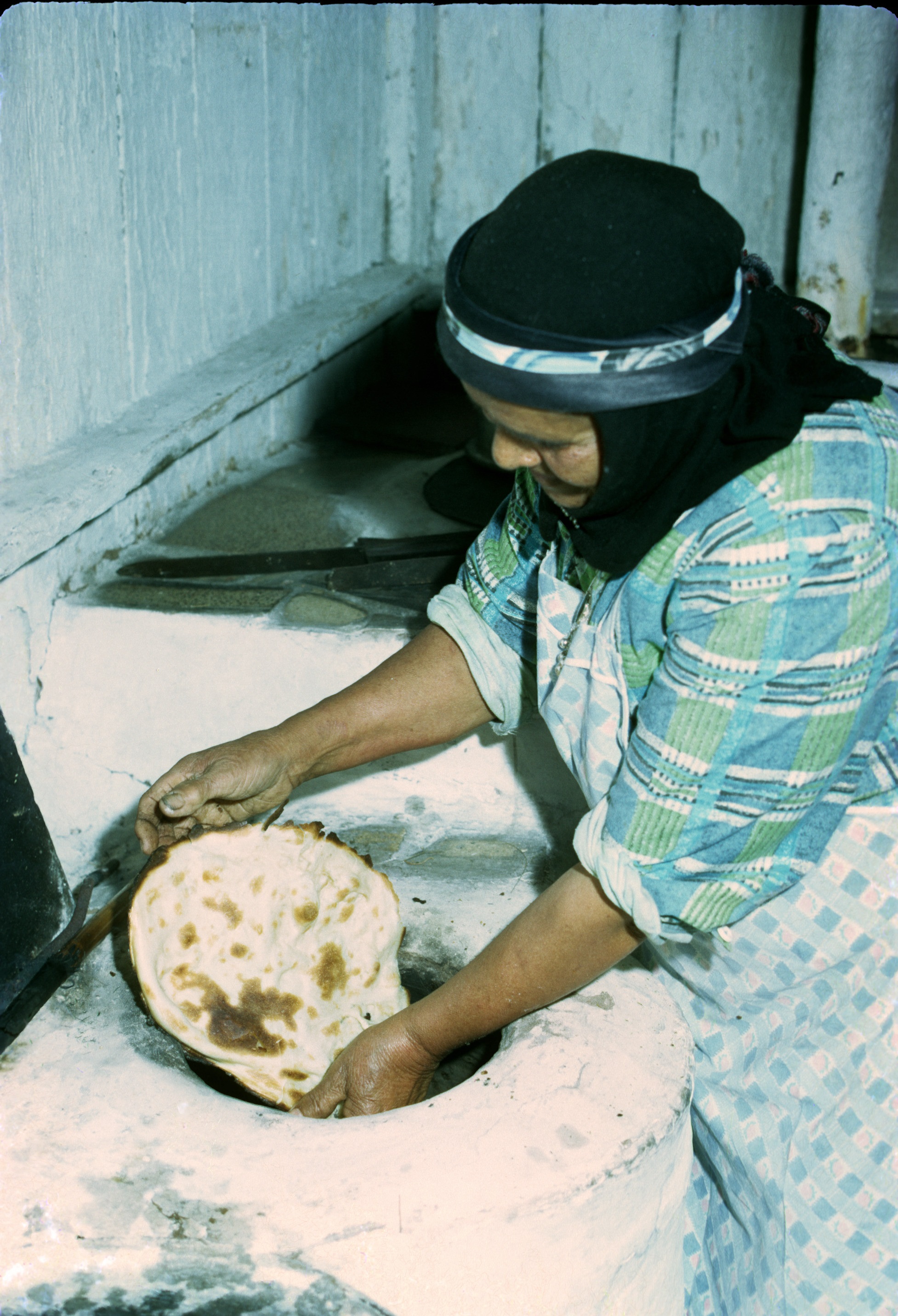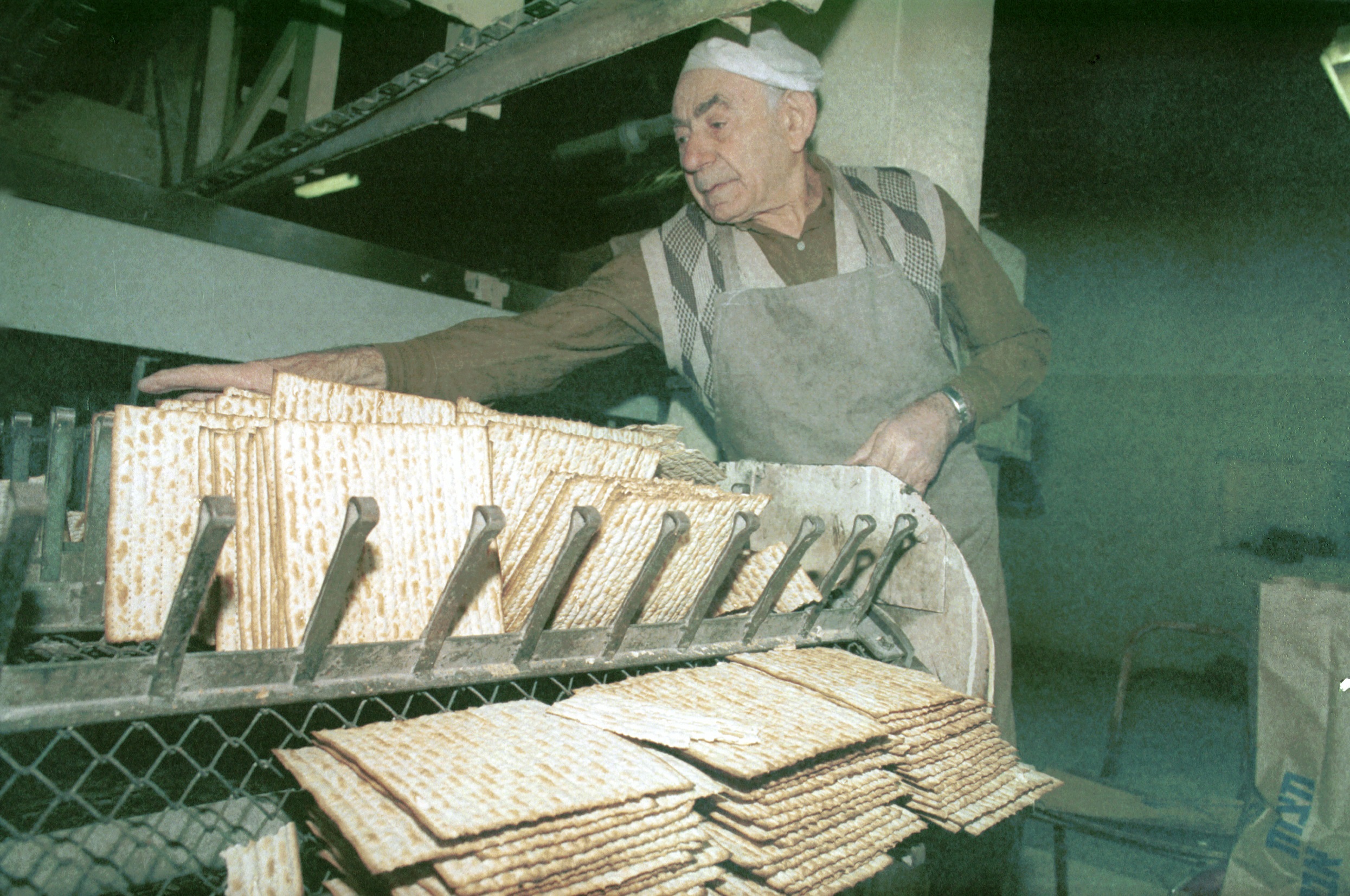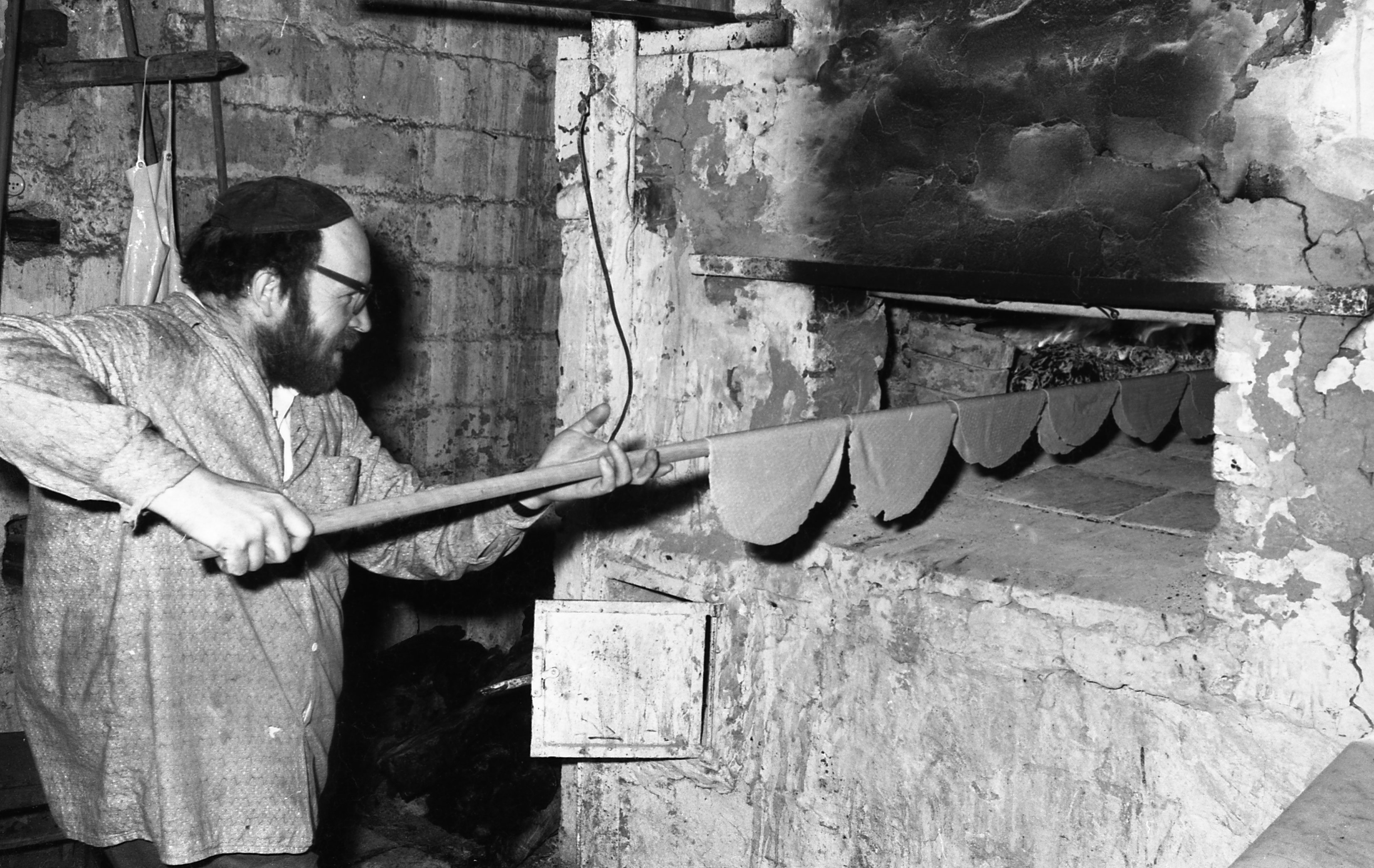
Matzah oven, Bukhara, Uzbekistan ©Zion Ozeri

Yemenite Woman Prepares Matzah, 1969 From the collection of the National Library of Israel

Aviv Matzah Factory, Israel, 1990 From the collection of the National Library of Israel

Preparing Shmura Matzah in Kfar Habad, 1972 From the collection of the National Library of Israel
מַתְנִי׳ עֶרֶב פְּסָחִים סָמוּךְ לַמִּנְחָה לֹא יֹאכַל אָדָם עַד שֶׁתֶּחְשַׁךְ. אֲפִילּוּ עָנִי שֶׁבְּיִשְׂרָאֵל לֹא יֹאכַל עַד שֶׁיָּסֵב, וְלֹא יִפְחֲתוּ לוֹ מֵאַרְבַּע כּוֹסוֹת שֶׁל יַיִן וַאֲפִילּוּ מִן הַתַּמְחוּי.
גְּמָ׳ מַאי אִירְיָא עַרְבֵי פְסָחִים? אֲפִילּוּ עַרְבֵי שַׁבָּתוֹת וְיָמִים טוֹבִים נָמֵי. דְּתַנְיָא: לֹא יֹאכַל אָדָם בְּעַרְבֵי שַׁבָּתוֹת וְיָמִים טוֹבִים מִן הַמִּנְחָה וּלְמַעְלָה כְּדֵי שֶׁיִּכָּנֵס לַשַּׁבָּת כְּשֶׁהוּא תַּאֲוָה, דִּבְרֵי רַבִּי יְהוּדָה. רַבִּי יוֹסֵי אוֹמֵר: אוֹכֵל וְהוֹלֵךְ עַד שֶׁתֶּחְשַׁךְ. אָמַר רַב הוּנָא: לָא צְרִיכָא אֶלָּא לְרַבִּי יוֹסֵי, דְּאָמַר: אוֹכֵל וְהוֹלֵךְ עַד שֶׁתֶּחְשַׁךְ — הָנֵי מִילֵּי בְּעַרְבֵי שַׁבָּתוֹת וְיָמִים טוֹבִים, אֲבָל בְּעֶרֶב הַפֶּסַח, מִשּׁוּם חִיּוּבָא דְמַצָּה מוֹדֶה. רַב פָּפָּא אָמַר: אֲפִילּוּ תֵּימָא רַבִּי יְהוּדָה, הָתָם בְּעַרְבֵי שַׁבָּתוֹת וְיָמִים טוֹבִים מִן הַמִּנְחָה וּלְמַעְלָה הוּא דַּאֲסִיר, סָמוּךְ לַמִּנְחָה שְׁרֵי. אֲבָל בְּעֶרֶב הַפֶּסַח, אֲפִילּוּ סָמוּךְ לַמִּנְחָה נָמֵי אָסוּר...
MISHNA: On the eve of Passover, adjacent to minḥa time, a person may not eat until dark. Even the poorest of Jews should not eat the meal on Passover night until he reclines. And the distributors of charity should not give a poor person less than four cups of wine for the Festival meal of Passover night. And this halakha applies even from the charity plate.
GEMARA: Why discuss this halakha particularly with regard to the eves of Passover? Even on the eves of Shabbat and other Festivals it is also prohibited to eat in the late afternoon, as it was taught in a baraita: A person should not eat on the eves of Shabbat and Festivals from minḥa time onward, so that he will enter Shabbat when he has a desire to eat and he will enjoy the Shabbat meal; this is the statement of Rabbi Yehuda.
Rabbi Yosei says: One may continue eating until dark.
Rav Huna said: The mishna was necessary only according to the opinion of Rabbi Yosei, who said that one may continue eating until dark. According to his opinion, the mishna is necessary to emphasize that this applies only on the eves of Shabbat and Festivals. But on the eve of Passover, due to the obligation to eat matza, Rabbi Yosei concedes that one must refrain from eating in the afternoon, so that he will eat matza with a good appetite.
Rav Pappa said: Even if you say that the mishna is in accordance with the opinion of Rabbi Yehuda, there is still a difference between the eves of Shabbat and other Festivals, as compared with the eve of Passover. There, on the eves of Shabbat and other Festivals, it is only from minḥa time onward that it is prohibited to eat, but adjacent to minḥa time it is permitted. However, on the eve of Passover, even adjacent to minḥa time, it is also prohibited to eat. For this reason, the mishna is referring specifically to the eve of Passover...
ואפילו עני שבישראל לא יאכל - בלילי פסחים עד שיסב כדרך בני חורין זכר לחירות במטה ועל השלחן:
Even the poorest of Israel should not eat on the eve of Pesach before he reclines in the manner of free people, in commemoration of freedom, on a couch and at a table.
(8) They shall eat the flesh that same night; they shall eat it roasted over the fire, with unleavened bread and with bitter herbs they are to eat it.
(14) This day shall be to you one of remembrance: you shall celebrate it as a festival to the LORD throughout the ages; you shall celebrate it as an institution for all time. (15) Seven days you shall eat unleavened bread; on the very first day you shall remove leaven from your houses, for whoever eats leavened bread from the first day to the seventh day, that person shall be cut off from Israel. (16) You shall celebrate a sacred occasion on the first day, and a sacred occasion on the seventh day; no work at all shall be done on them; only what every person is to eat, that alone may be prepared for you. (17) You shall observe the [Feast/Festival of] Unleavened Bread, for on this very day I brought your ranks out of the land of Egypt; you shall observe this day throughout the ages as an institution for all time. (18) In the first month, from the fourteenth day of the month at evening, you shall eat unleavened bread until the twenty-first day of the month at evening. (19) No leaven shall be found in your houses for seven days. For whoever eats what is leavened, that person shall be cut off from the community of Israel, whether he is a stranger or a citizen of the country. (20) You shall eat nothing leavened; in all your settlements you shall eat unleavened bread.
(ג) וַיֹּ֨אמֶר מֹשֶׁ֜ה אֶל־הָעָ֗ם זָכ֞וֹר אֶת־הַיּ֤וֹם הַזֶּה֙ אֲשֶׁ֨ר יְצָאתֶ֤ם מִמִּצְרַ֙יִם֙ מִבֵּ֣ית עֲבָדִ֔ים כִּ֚י בְּחֹ֣זֶק יָ֔ד הוֹצִ֧יא יְהֹוָ֛ה אֶתְכֶ֖ם מִזֶּ֑ה וְלֹ֥א יֵאָכֵ֖ל חָמֵֽץ׃
(3) And Moses said to the people, “Remember this day, on which you went free from Egypt, the house of bondage, how the LORD freed you from it with a mighty hand: no fermentation shall be eaten.
(ה) רבן גמליאל היה אומר: כל שלא אמר שלשה דברים אלו בפסח, לא יצא ידי חובתו, ואלו הן: פסח, מצה, ומרור. פסח - על שום שפסח המקום על בתי אבותינו במצרים. מצה - על שום שנגאלו אבותינו ממצרים.
(5) Rabban Gamliel used to say: Whoever does not mentioned these three things on Passover does not discharge his duty, and these are they: the Passover-offering, matzah, and maror. The Passover-offering, because God passed over the houses of our ancestors in Egypt. Matzah, because our ancestors were redeemed from Egypt.
הָא לַחְמָא עַנְיָא דִּי אֲכָלוּ אַבְהָתָנָא בְאַרְעָא דְמִצְרָיִם. כָּל דִכְפִין יֵיתֵי וְיֵיכֹל, כָּל דִצְרִיךְ יֵיתֵי וְיִפְסַח. הָשַּׁתָּא הָכָא, לְשָׁנָה הַבָּאָה בְּאַרְעָא דְיִשְׂרָאֵל. הָשַּׁתָּא עַבְדֵי, לְשָׁנָה הַבָּאָה בְּנֵי חוֹרִין.
This is the lechem oni (bread of affliction/poverty) that our ancestors ate in the land of Egypt. Anyone who is famished should come and eat, anyone who is in need should come and partake of the Pesach sacrifice. Now we are here, next year we will be in the land of Israel; this year we are slaves, next year we will be free people.
Rabbi Eliyahu ben Harosh d.1883, Kos shel Eliyahu on the Haggadah
At the beginning of the Haggadah, we open the story of the Exodus with a statement in which we call matzah, lachma anya, the bread of affliction, which our ancestors ate while they were in Egypt. Later, we explain the reason for matzah differently: our ancestors ate matzah when they left Egypt because they left in haste and the dough did not have time to rise. These two explanations seem to contradict one another. Rabbi David Abudraham, in his commentary, wonders why we begin the Seder by referring to matzah as ‘the bread which our ancestors ate in Egypt.’ If matzah was baked when our ancestors left Egypt, how can we then say that it also the bread which our ancestors ate before they left Egypt: “They shall eat the Passover offering with matzah and maror?” Why did the Israelites eat matzah before they left Egypt? It was a portent of what was to come for the Israelites. It was a sign that they would leave Egypt in such haste that they would not have time to bake bread or for their dough to rise…. There are other reasons that we eat matzah as well. The poor eat matzah because it takes time to digest so that they will not be hungry as often. Also, it is easy and quick to prepare so that those who return home would have something to eat quickly.
ולא יאכל חמץ. כדי להשריש הזכירה בלב על ידי איזה פעולה המראה ומזכיר זה הענין צויתי שלא יאכל חמץ, דמצה אין בה יתרון על ידי האדם להעלות העיסה יותר מהקמח והמים שנבראים ממנו יתברך...
HaEmek Davar on Exodus 13:3
You shall not eat chametz. I commanded you not to eat chametz in order to root the awareness of this idea in the heart through some action that teaches and reminds us. Matzah does not benefit from the stratagems of human hands, to rise the dough any more than bread and water- which were created by the Blessed One.
Rabbi Yerachmiel Danziger d. 1910, Yismach Yisrael on the Haggadah
The purpose of matzah is to bring us to a state of submission and self-abnegation. It teaches us that everything comes from God and not through our own ability. This is a lesson we learn from the sages: “A person says, “I have learned wisdom and Torah, what need have I of in performing commandments?’ The Holy One responds: ‘Acquiring knowledge of Torah is a simple matter. Acting in a God-fearing manner is another matter! One who fears me and then performs acts of Torah, wisdom and Torah will be in his heart as it is written (Palms 111:10): ‘The beginning of wisdom is fear of the Lord; they have understanding who perform His commandments.” (Devarim Rabbah 11:6) Through humility and self-abnegation one comes to a state of fear of the Lord. All wisdom is already present in his heart but it is only through submission of one’s ego that one becomes worthy of learning Torah freely. From matzah we derive fear of God from above and through fear and awe we merit the learning of Torah and other blessings. -
B'nai Yissachar
We should carefully examine this fact: Throughout the entire Torah, this festival is called “The Feast of Matzot.” Yet, Jews call the festival “The Feast of Passover.”
Give ear to this teaching -- we’ve heard it taught in the name of the Holy, Renowned Rabbi whose Jewish leadership, teaching, and holiness are great, our teacher, Rabbi Levi Yitzchak of Berdichev (may the memories of the righteous and holy be a blessing) --
Look: In Torah it is written (Exod 12:39): “And they baked unleavened cakes of the dough that they had taken out of Egypt, for it was not leavened, since they had been driven out of Egypt and could not delay; nor had they prepared any provisions for themselves.” For this, God praised them through the words of His prophet: “Thus says the Eternal: I remember the devotion of your youth, how you loved Me as a bride, following me in the desert, in a land unsown” (Jer 2:2). Note that they didn’t ask, “should we take provisions?” They simply trusted in the Eternal, and were sure of His salvation. And so they took only dough, to bake unleavened cakes.
And look: the Passover sacrifice that the Jews ate in Temple times was performed because the Omnipresent One passed over the houses of our ancestors, etc...
This is why God, in the Torah, calls the holiday “The Feast of Matzot.” In doing so, God is praising the Jewish People for baking unleavened bread which they brought out of Egypt as cakes of matzot, and for not taking along provisions for themselves.
Meanwhile, the Jewish people call the holiday “Passover” in praise of the Holy One, “who passed over the homes of the Israelites...when He struck Egypt, but saved our houses” (Exod 12:27).
This is like the bread of poverty which our ancestors ate: As we begin the Haggadah, we do so by emphasizing the power of God. Matzah serves as a symbol of memory. When we refer to the bread of affliction we are reminded that despite the fact that Pharaoh was so powerful that no slave ever escaped from Egypt, we were able to do so with the help of God. Matzah teaches us that we could not have escaped from Egypt on our own. Other people would have taken credit for their escape, but the bread of affliction is a reminder that we were powerless on our own. When we contemplate the meaning of Matzah which our ancestors ate and through which our ancestors merited God's blessings, we are affirm that the hand of God is all powerful, the creator of light and darkness. Matzah is not the food of slavery but an affirmation of God's providence, the One who creates the rich and the poor...
Perush Kadum, a Yemenite commentary pre-16th century
Just as the Passover offering taught the swiftness of God’s justice, so matzah teaches us the swiftness of God’s act. There was not even time for the people to allow their dough to rise when He redeemed them. The people could not tarry while the dough became leavened and there was no time for them to prepare provision for the journey. The dough they brought out of Egypt provided them with food for an entire month, from the 15th of Nisan until the fifteenth of the next month, when they came to ask God for food in the wilderness. -
Rabbi Yaakov Lorberbaum d.1832, Ma’aseh Nissim, Haggadah
The Haggadah explains that we eat matzah to remind us of the haste with which we left Egypt. Yet we ate matzah prior to leaving Egypt. So how do we explain matzah? Rabbi Eliezer Ashkenazi, in his commentary Ma’aseh Adonai, explains that there are two separate reasons for eating matzah. We eat matzah throughout the week of Passover as a reminder that we were slaves in Egypt. But we eat matzah on the first night of Passover at the Seder as a means or reenacting the haste with which we left Egypt. On Seder night it is an obligation to eat matzah but during the week of Passover, matzah is a reminder of being enslaved in Egypt (and not a commandment). Matzah is lechem oni, the bread of affliction. We refrain from eating leavened bread and only eat matzah for seven days to symbolize the fact that the people of Israel were slaves in Egypt for a very long time. The seven days of Passover symbolize the seven days of creation and the fact that the Israelites were enslaved all seven days of the week. So we eat matzah Sunday for all the Sundays, Monday for all the Mondays, etc.
'אֵל מוֹצִיאָם מִמִּצְרַיִם', דְּהַיְנוּ שֶׁהַשֵּׁם יִתְבָּרַךְ בְּעַצְמוֹ הוֹצִיאָם עַל-יְדֵי אִתְעָרוּתָא דִּלְעֵלָּא בְּלִי אִתְעָרוּתָא דִּלְתַתָּא, כִּי לֹא הִמְתִּין שֶׁיִּצְטַיֵּר הָאוֹר לְפִי בְּחִינַת הַכְּלִי שֶׁלָּהֶם שֶׁהִיא בְּחִינַת אִתְעָרוּתָא דִּלְתַּתָּא, רַק אֵל מוֹצִיאָם מִמִּצְרַיִם, שֶׁהוּא בְּעַצְמוֹ צִיֵּר הָאוֹר לְטוֹבָה וְהוֹרִיד הָאוֹר מִלְּמַעְלָה...
וְזֶהוּ בְּחִינַת אֲכִילַת מַצָּה עַל שׁוּם שֶׁלֹּא הִסְפִּיק בְּצֵקָם שֶׁל אֲבוֹתֵינוּ לְהַחֲמִיץ עַד שֶׁנִּגְלָה עֲלֵיהֶם מֶלֶךְ מַלְכֵי הַמְּלָכִים הַקָּדוֹשׁ בָּרוּךְ הוּא וּגְאָלָם, שֶׁנֶּאֱמַר, "וַיֹּאפוּ אֶת הַבָּצֵק וְכוּ'". כִּי מַצָּה הוּא בְּחִינַת מֹחִין גְּדוֹלִים מְאֹד הַבָּאִים מִלְּמַעְלָה, כִּי מַצָּה הוּא בָּצֵק שֶׁאֵין מַנִּיחִים אוֹתוֹ לְהַחֲמִיץ, רַק אוֹפִין אוֹתוֹ מִיָּד בְּעֵת שֶׁהוּא מַצָּה קֹדֶם שֶׁבָּא לִידֵי חִמּוּץ, הַיְנוּ בְּחִינַת הַנַּ"ל, בְּחִינַת הָאוֹר הַבָּא מִלְּמַעְלָה שֶׁהוּא קָמִיץ וְסָתִים, שֶׁהוּא אוֹר פָּשׁוּט שֶׁמִּצְטַיֵּר תָּמִיד כְּפִי בְּחִינַת הַכְּלִי כַּנַּ"ל וְעַכְשָׁיו נִצְטַיֵּר מִיָּד לְמַעְלָה קֹדֶם שֶׁיֵּרֵד לְהִצְטַיֵּר לְמַטָּה כְּפִי הַכְּלִי:
(Numbers 23:22) "God took them out of Egypt," meaning that the blessed God brought them out independently - through an awakening from above, and without an awakening from below. Because God did not wait for the light to take form according to their vessels - which is the aspect of an awakening from below. Rather, "God took them out Egypt," meaning that God independently formed the light for good and caused it to descend from above...
And this is the quality of eating matzah - "matzah, because our ancestors' dough did not have time to rise until the King of All Kings, Holy Blessed One, was revealed to them and redeemed them." As it says (Exodus 12:39) "and they baked the dough etc." Because matzah is the aspect of an extremely expansive awareness, that comes from above; for matzah is dough that is not left to rise but is rather baked immediately while it is still matzah, before it becomes leavened - similar to the light that comes from above which is condensed and concealed, which is the undifferentiated light that always takes shape according to the vessel [that receives it], as discussed above. But now it is formed above immediately, before it makes the descent below to be shaped according to the vessel.



